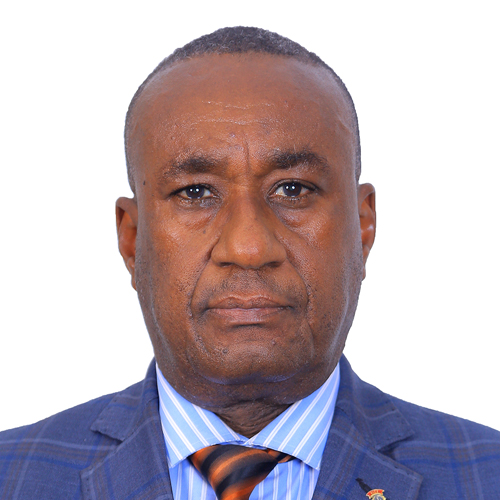SUSTAINABLE DEVELOPMENT IN POST-PANDEMIC AFRICA: Effective Strategies for Resource Mobilization

BOOK SUMMARY
With both domestic and external financing drying up in the face of COVID-19, and its aftermath, existing unmet financing needs for the SDGs in Africa will be further exacerbated. To ensure the current crisis does not erase years of development gains, and that African countries are more resilient to future crises, it is important to rethink and reconfigure current private, public, domestic, and external financing sources under a forward-looking framework.
THE AUTHORS
VIDEO INTERVIEWS
CHAPTER SUMMARIES
Fred Olayele and Yiagadeesen Samy
Concluding Remarks
Africa must leverage the recovery from the pandemic as an opportunity to prepare itself for the emerging new global economic order. Policymakers must ensure ongoing recovery efforts maximize opportunities for inclusive growth and use the pandemic as a springboard for structural economic transformation.
Mahamadou Nassirou Ba
Harnessing the Agriculture Value Chain for Development
For Africa to harness the agricultural value chains, a different paradigm is needed: an inclusive agricultural transformation with a sustained increase in productivity and farmer’s income. This chapter elaborates on the need for economies of scale, economies of complementarity, and economies of vertical integration.
Jean-Paul Adam and Fred Olayele
Africa’s Blue Economy as a Development Finance Opportunity
We present a case study on how Seychelles offers ample lessons for other African countries in terms of using innovative mechanisms to finance development priorities, while simultaneously leveraging the blue economy approach to harness and capture sustainable value from natural resources for equitable and sustainable economic growth.
Fergus T. Maclaren
The Sustainability and Resiliency Challenges Confronting Africa’s Tourism Industry
This chapter provides a background analysis of the effectiveness of African tourism development prior to COVID-19 and then examines how five initiatives can mobilize resources to help build resilience and sustainability, and the potential areas of opportunity and risk that may benefit or undermine their implementation.
Samuel Ojo Oloruntoba and Yiagadeesen Samy
Revisiting Africa’s Deindustrialization Debate
Drawing from extant literature and recent data, this chapter delves into how concerns about deindustrialization may have been exaggerated. On the other hand, after accounting for different country-specific and regional experiences, we argue that Africa has not seen the kind of industrial expansion experienced elsewhere.
Craig Atkinson and Joseph Potvin
Implementing the AfCFTA: A Computational Approach for Algorithmic Governance
This chapter suggests a rationale for a simple, scalable, and fast computational approach through the ‘Data With Direction Specification’ (DWDS) to supplement the implementation of the African Continental Free Trade Area (AfCFTA). The specification provides a way for digitally executable versions of rules.
Bartholomew Armah
Rethinking Fiscal Space and Debt Sustainability
This chapter examines the drivers of Africa’s debt vulnerabilities and calls for stronger public and private blended financing approaches to address the continent’s development financing needs. It argues that on current trends, bilateral and multilateral financing is inadequate to fill the continent’s financing gap.
David Oludotun Fasanya
Repurposing FDI Inflows for Development Finance in Africa
Repurposing Africa’s FDI flows for development finance is crucial for transcending the post-pandemic era. Refocusing on strategic priority areas can fervently stimulate economic development and ‘holistic knowledge spillovers’ across its labour sectors. Policy roadmaps will be pivotal to maximising key opportunities in its green economy, among others.
Andrew S. Nevin, Adunola Bello, and Omomia Omosomi
Correcting the Myths
There is a popular conception that Nigeria is an oil economy. While this is true in terms of contribution to public sector revenue, sectors like ICT and the creative economy contribute more to GDP. This chapter makes a case for the Brain Capital strategy.
Titi Olayele
Redesigning Africa’s TVET to Achieve the SDGs
In many regions of the world, including Africa, Technical and Vocational Education and Training (TVET) is generally perceived as inferior to academic study. With a saturated white-collar job market, youth unemployment remains a fundamental development challenge in Africa. This chapter explores the role of skills acquisition.
Akolisa Ufodike and Susanna Ally
Enhancing Gender-Responsive Financing in Africa
African women experience numerous barriers in society due to a lack of access to education, health, property rights, and economic tools for generating income and achieving prosperity. Moreover, within the current global financial system, African women entrepreneurs are limited by many restrictive criteria for investments.
Matt Gouett
SWFs: It Is Raining, But Where Are the Funds
Lauded as “rainy-day funds” for governments, sovereign wealth funds (SWFs) have been viewed as a responsible fiscal policy tool for resource-dependent economies. While African countries have been prolific in creating funds, they have been less successful in funding them after initial capitalization.
Marit Kitaw and John Sloan
Harnessing Minerals for an African Battery Value Chain
The surge in the demand for green minerals as a result of the global transition toward a decarbonized world provides a historic opportunity for a reset toward sustainability. This chapter explores how mineral-rich African countries can leverage their endowments in green minerals.
Fred Olayele and Yiagadeesen Samy
Effective Strategies for Resource Mobilization in Post-Pandemic Africa
This chapter argues that current levels of bilateral and multilateral financing are insufficient to address Africa’s financing needs. We highlight a series of measures – such as crowding in private finance, blending private and public financing, improved domestic resource mobilization, and domestic policy reforms – to enhance development financing.
Akinwumi A. Adesina
Foreword: Effective Strategies for Resource Mobilization in Post-Pandemic Africa
Resource mobilization lies at the heart of sustainable development. As the world enters a decisive phase in the battle against Covid-19, Africa must develop innovative finance mechanisms to build back better, prepare for potential future pandemics, and protect the lives of its rapidly growing population.
CHAPTER SUMMARIES
Akinwumi A. Adesina
Foreword: Effective Strategies for Resource Mobilization in Post-Pandemic Africa
Resource mobilization lies at the heart of sustainable development. As the world enters a decisive phase in the battle against Covid-19, Africa must develop innovative finance mechanisms to build back better, prepare for potential future pandemics, and protect the lives of its rapidly growing population.
Fred Olayele and Yiagadeesen Samy
Effective Strategies for Resource Mobilization in Post-Pandemic Africa
This chapter argues that current levels of bilateral and multilateral financing are insufficient to address Africa’s financing needs. We highlight a series of measures – such as crowding in private finance, blending private and public financing, improved domestic resource mobilization, and domestic policy reforms – to enhance development financing.
Marit Kitaw and John Sloan
Harnessing Minerals for an African Battery Value Chain
The surge in the demand for green minerals as a result of the global transition toward a decarbonized world provides a historic opportunity for a reset toward sustainability. This chapter explores how mineral-rich African countries can leverage their endowments in green minerals.
Matt Gouett
SWFs: It Is Raining, But Where Are the Funds
Lauded as “rainy-day funds” for governments, sovereign wealth funds (SWFs) have been viewed as a responsible fiscal policy tool for resource-dependent economies. While African countries have been prolific in creating funds, they have been less successful in funding them after initial capitalization.
Akolisa Ufodike and Susanna Ally
Enhancing Gender-Responsive Financing in Africa
African women experience numerous barriers in society due to a lack of access to education, health, property rights, and economic tools for generating income and achieving prosperity. Moreover, within the current global financial system, African women entrepreneurs are limited by many restrictive criteria for investments.
Titi Olayele
Redesigning Africa’s TVET to Achieve the SDGs
In many regions of the world, including Africa, Technical and Vocational Education and Training (TVET) is generally perceived as inferior to academic study. With a saturated white-collar job market, youth unemployment remains a fundamental development challenge in Africa. This chapter explores the role of skills acquisition.
Andrew S. Nevin, Adunola Bello, and Omomia Omosomi
Correcting the Myths
There is a popular conception that Nigeria is an oil economy. While this is true in terms of contribution to public sector revenue, sectors like ICT and the creative economy contribute more to GDP. This chapter makes a case for the Brain Capital strategy.
David Oludotun Fasanya
Repurposing FDI Inflows for Development Finance in Africa
Repurposing Africa’s FDI flows for development finance is crucial for transcending the post-pandemic era. Refocusing on strategic priority areas can fervently stimulate economic development and ‘holistic knowledge spillovers’ across its labour sectors. Policy roadmaps will be pivotal to maximising key opportunities in its green economy, among others.
Bartholomew Armah
Rethinking Fiscal Space and Debt Sustainability
This chapter examines the drivers of Africa’s debt vulnerabilities and calls for stronger public and private blended financing approaches to address the continent’s development financing needs. It argues that on current trends, bilateral and multilateral financing is inadequate to fill the continent’s financing gap.
Craig Atkinson and Joseph Potvin
Implementing the AfCFTA: A Computational Approach for Algorithmic Governance
This chapter suggests a rationale for a simple, scalable, and fast computational approach through the ‘Data With Direction Specification’ (DWDS) to supplement the implementation of the African Continental Free Trade Area (AfCFTA). The specification provides a way for digitally executable versions of rules.
Samuel Ojo Oloruntoba and Yiagadeesen Samy
Revisiting Africa’s Deindustrialization Debate
Drawing from extant literature and recent data, this chapter delves into how concerns about deindustrialization may have been exaggerated. On the other hand, after accounting for different country-specific and regional experiences, we argue that Africa has not seen the kind of industrial expansion experienced elsewhere.
Fergus T. Maclaren
The Sustainability and Resiliency Challenges Confronting Africa’s Tourism Industry
This chapter provides a background analysis of the effectiveness of African tourism development prior to COVID-19 and then examines how five initiatives can mobilize resources to help build resilience and sustainability, and the potential areas of opportunity and risk that may benefit or undermine their implementation.
Jean-Paul Adam and Fred Olayele
Africa’s Blue Economy as a Development Finance Opportunity
We present a case study on how Seychelles offers ample lessons for other African countries in terms of using innovative mechanisms to finance development priorities, while simultaneously leveraging the blue economy approach to harness and capture sustainable value from natural resources for equitable and sustainable economic growth.
Mahamadou Nassirou Ba
Harnessing the Agriculture Value Chain for Development
For Africa to harness the agricultural value chains, a different paradigm is needed: an inclusive agricultural transformation with a sustained increase in productivity and farmer’s income. This chapter elaborates on the need for economies of scale, economies of complementarity, and economies of vertical integration.
Fred Olayele and Yiagadeesen Samy
Concluding Remarks
Africa must leverage the recovery from the pandemic as an opportunity to prepare itself for the emerging new global economic order. Policymakers must ensure ongoing recovery efforts maximize opportunities for inclusive growth and use the pandemic as a springboard for structural economic transformation.




















